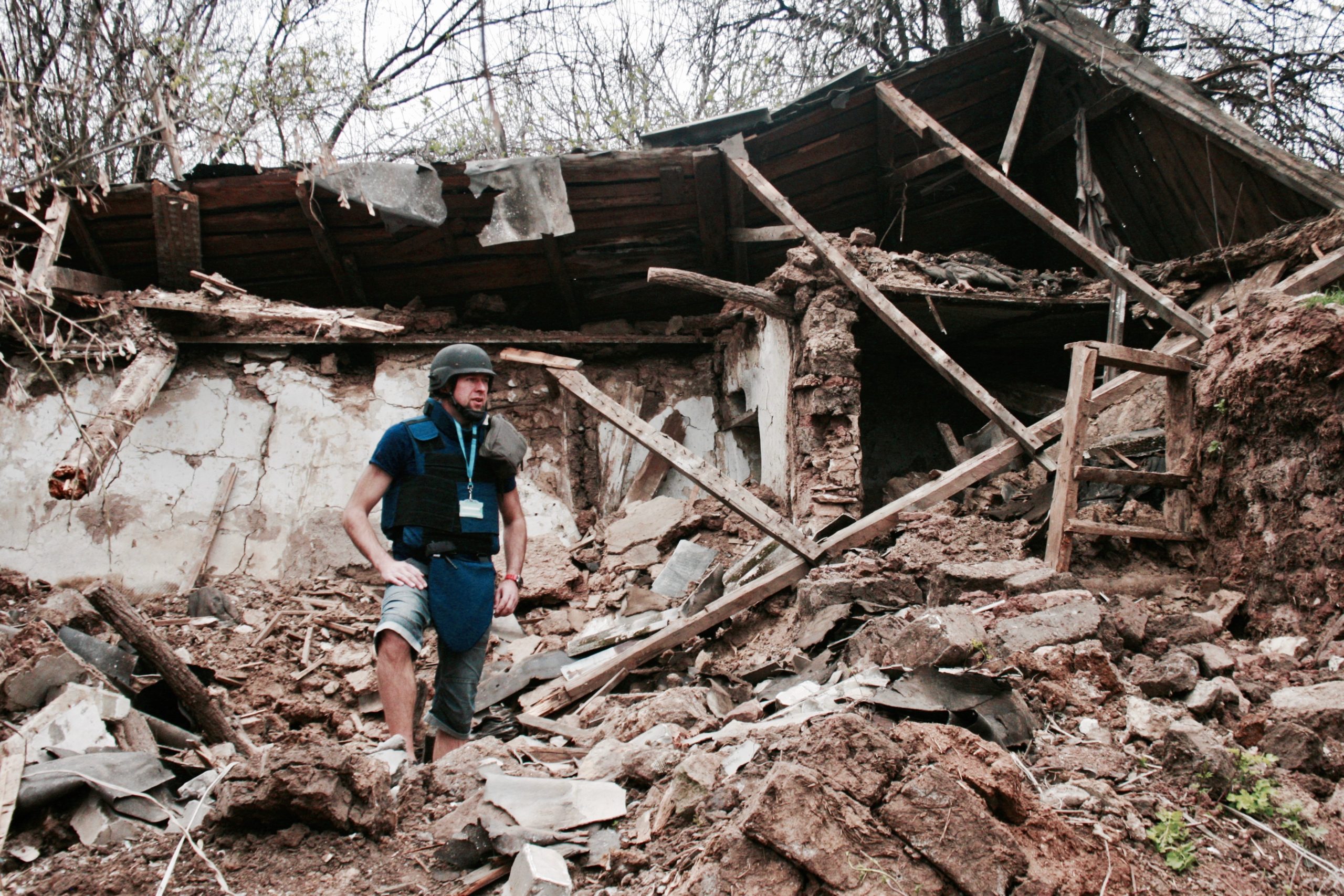What we do:
- Collect evidence of human rights violations and war crimes and store it in the I-DOC database
- Analyse the material with our legal and contextual expertise
- Provide case files on suspects to states and international institutions so they can prosecute or sanction them
The Documentation and Accountability Hub (DAH) is NHC’s main commitment towards the work with international justice and accountability, combating impunity, and preserving accurate historical memory.
As of 2023, the DAH consists of 3 main pillars focusing on collection and analysis of evidence of international criminal law and human rights law violations in the North Caucasus, Ukraine and Belarus. This work enables the NHC to actively apply transitional justice mechanisms (such as sanction and universal jurisdiction tools) in the fight against impunity.
Besides these core directions, DAH provides advice and support to civil society actors in NHC’s other programme countries.
In these projects, we co–operate with the CILRAP’s Case Matrix Network (CMN) on an online Database – IDOC. The IDOC ensures the efficient processing of large amounts of information through the utilisation of effective documentation methods.
What does it mean?
We document crimes through collection of evidence and documentation in the field, through testimonies of survivors and witnesses, and open-source intelligence.
We systematise the material by diligently entering it into the IDOC database according to set parameters.
We analyse the material through parameters of the database and contributions from our experts of international law, military and the conflict in question.
We make sure that the material from the database is used in processes to punish perpetrators through submission of names to sanction lists, as evidence in court cases on local and international level, or in universal jurisdiction cases.
NEDC’s Legacy
DAH’s history dates to 2010 when the Norwegian Helsinki Committee, together with 8 leading international and Russian organisations, established The Natalia Estemirova Documentation Center. Back then, it was hard to foresee that our methodology and experience with documenting gross violations committed during the armed conflicts in Chechnya, would expand and become a general tool used by many local organisations to document atrocities in their respective countries – including Ukraine.
Over the span of the last 13 years, the NEDC has become the world’s largest digital archive of human rights documentation (with more than one million materials and documents) about armed conflicts and international crimes in Chechnya and the North Caucasus.
The name of the Center refers to and aspire to honor our brave colleague and friend – Natalia Estemirova, who was head of Memorial’s office in Groznyy, Chechnya. She was abducted in the Chechen Republic and killed on 15 July 2009 because of her persistent efforts to document grave violations during the second armed conflict in Chechnya.
In 2019, the Center started sharing information with the public in Russian and English on its website www.nedc-nhc.org. The website contains audio materials – stories told by victims or their family members – in addition to photos and descriptions of the gravest and most widespread violations.

Documentation in Chechnya
First armed conflict in Chechnya – 11.01.1994 – 31.08.1996.
Second armed conflict in Chechnya – 01.10.1999 – 16.04.2009 according to Russian version / However, main Chechen armed groups left Chechnya in the end of 2014 (and hostilities continue).
The NEDC includes (as of September 2023):
- Materials stored in the archive: over one million files such as documents, video and audio materials.
- Registered and analysed Documents in the IDOC – over 52 600 (mostly related to the second armed conflict).
- 86 700 analysed profiles of victims.
- 7 700 systematised incidents.
Three gravest and widespread human rights violations according to the analysis*:
- Killings – 7 506 verified victims.
- Enforced Disappearances – 6 407 verified victims.
- Torture – 3 489 verified victims.
* These numbers cover only collected and already analysed information. The real number of violations is significantly higher.

Ukraine
Already in 2014, when Russia invaded Ukraine, the NHC was ready to hit the ground running, offer relevant help and share our NEDC’s experience with Ukrainian actors documenting the atrocities.
By starting to co-operate with a local human rights organisation – Truth Hounds and the Ukrainian Attorney General of Crimea, we expanded our documentation work to cover the Crimean Peninsula and the occupied areas of Eastern Ukraine.
Since the full-scale invasion of Ukraine on February 24, 2022 the NHC together with Truth Hounds and the CMN established a cooperation with the Ukraine 5 AM Coalition (consisting of 30 human rights initiatives and NGOs) and expanded the documentation work to the entire country.
With the support from the public, the Norwegian government and other public or private actors we provide our partners with the necessary equipment to carry out documentation in the field (cars, bulletproof vests, helmets and etc.) as well as software and methodology that has a key role in collecting and systematizing evidence from the ground in Ukraine.
Crimea and Ukraine war
2014 – Annexation of Crimea and armed conflict in Donetsk and Luhansk
24.02.2022 – Full-scale invasion of Ukraine by Russia
The IDOC Database contains thousands of materials such as documents, video and audio files, analysed profiles of victims and systemised incidents, and the number keeps growing.

Belarus
In 2020, following the mass-protests against the Lukashenko regime in the wake of the presidential election, the NHC intensified its work and documentation efforts in Belarus.
In order to address unlawful arrests, persecution, torture and other mass violations of human rights, together with the local initiative we started to collect and safekeep information about the mass violations.
These efforts are currently ongoing.
Contact us
Employee
